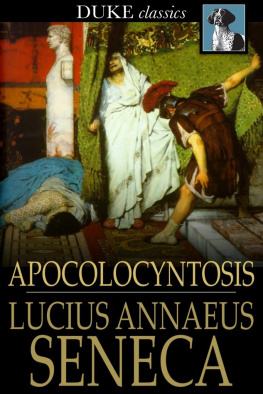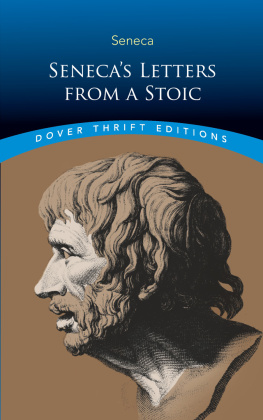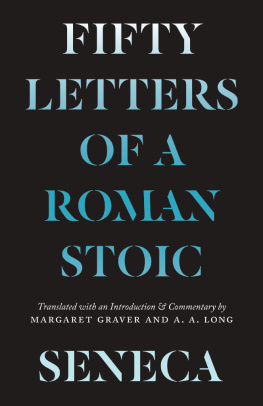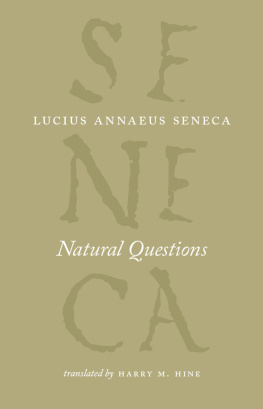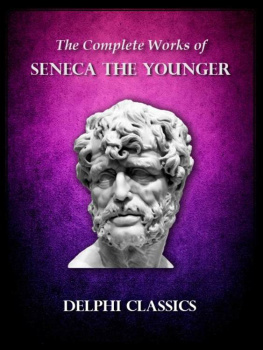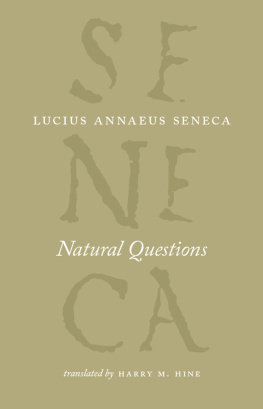OXFORD WORLDS CLASSICS
DIALOGUES AND ESSAYS
LUCIUS ANNAEUS SENECA (c.1 BCAD 65) was born in Corduba, Spain, and educated in Rome. Plagued all his life by ill health, he embarked on a political career after a stay in Egypt. In 41 he was exiled by the emperor Claudius and only returned to Rome in 49, when he became tutor to the young Nero. Together with the prefect of the Praetorian Guard Sextus Afranius Burrus, he acted as a senior adviser to Nero until 62, withdrew to private life, and was forced to commit suicide in 65. He had taken up writing as a young man. His earliest extant treatises date from the period before his exile. He continued to write throughout his life and was particularly productive in his final years. His treatises are recognized as the most important body of work on Stoicism in Latin. He also wrote the Letters to Lucilius and several tragedies, the earliest extant specimens of the genre in Latin.
JOHN DAVIE is Head of Classics at St Pauls School, London. He is the author of a number of articles on classical subjects and has recently translated the complete surviving plays of Euripides for Penguin Classics (four volumes). A member of the Hellenic Societys and Roman Societys Visiting Panel of Lecturers, he divides his time between London and Oxford, where he teaches Classics to undergraduates at Balliol and other colleges.
TOBIAS REINHARDT is Fellow and Tutor in Latin and Greek at Somerville College, Oxford. He has published books on Aristotle, Cicero, and (jointly with Michael Winterbottom) on Quintilian.
OXFORD WORLDS CLASSICS
For over 100 years Oxford Worlds Classics have brought readers closer to the worlds great literature. Now with over 700 titlesfrom the 4,000-year-old myths of Mesopotamia to the twentieth centurys greatest novelsthe series makes available lesser-known as well as celebrated writing.
The pocket-sized hardbacks of the early years contained introductions by Virginia Woolf, T. S. Eliot, Graham Greene, and other literary figures which enriched the experience of reading.
Today the series is recognized for its fine scholarship and reliability in texts that span world literature, drama and poetry, religion, philosophy and politics. Each edition includes perceptive commentary and essential background information to meet the changing needs of readers.
OXFORD WORLDS CLASSICS
SENECA
Dialogues and Essays
Translated by
JOHN DAVIE
With an Introduction and Notes by
TOBIAS REINHARDT


Great Clarendon Street, Oxford OX2 6DP
Oxford University Press is a department of the University of Oxford.
It furthers the Universitys objective of excellence in research, scholarship,
and education by publishing worldwide in
Oxford New York
Auckland Cape Town Dar es Salaam Hong Kong Karachi
Kuala Lumpur Madrid Melbourne Mexico City Nairobi
New Delhi Shanghai Taipei Toronto
With offices in
Argentina Austria Brazil Chile Czech Republic France Greece
Guatemala Hungary Italy Japan Poland Portugal Singapore
South Korea Switzerland Thailand Turkey Ukraine Vietnam
Oxford is a registered trade mark of Oxford University Press
in the UK and in certain other countries
Published in the United States
by Oxford University Press Inc., New York
Translation John Davie
Editorial material Tobias Reinhardt
The moral rights of the authors have been asserted
Database right Oxford University Press (maker)
First published as an Oxford Worlds Classics paperback 2007
All rights reserved. No part of this publication may be reproduced,
stored in a retrieval system, or transmitted, in any form or by any means,
without the prior permission in writing of Oxford University Press,
or as expressly permitted by law, or under terms agreed with the appropriate
reprographics rights organization. Enquiries concerning reproduction
outside the scope of the above should be sent to the Rights Department,
Oxford University Press, at the address above
You must not circulate this book in any other binding or cover
and you must impose this same condition on any acquirer
British Library Cataloging in Publication Data
Data available
Library of Congress Cataloging-in-Publication Data
Seneca, Lucius Annaeus, ca. 4 B.C.-65 A.D.
[Selections. English. 2007]
Dialogues and essays / Seneca; translated by John Davie; with an
introduction and notes by Tobias Reinhardt.
p. cm. (Oxford worlds classics)
Includes bibliographical references.
ISBN-13: 9780192807144 (alk. paper) 1. Seneca, Lucius Annaeus,
ca. 4 B.C.-65 A.D.Translations into English. 2. Conduct of
lifeEarly works to 1800. 3. EthicsEarly works to 1800. I. Davie,
John N. II. Reinhardt, Tobias. III. Title.
PA6661.A7S46 2007
878.0109dc22 2007016351
Typeset by Cepha Imaging Private Ltd., Bangalore, India
Printed in Great Britain
on acid-free paper by
Clays Ltd, St Ives plc
ISBN 9780192807144
1 3 5 7 9 10 8 6 4 2
CONTENTS
INTRODUCTION
Senecas Life and Career
Lucius Annaeus Seneca was born around 1 BC as the second of three sons into a wealthy family of the equestrian class in what is today Cordoba in southern Spain. His father, likewise born in Spain but of Italian descent, is known as Seneca the rhetor; he had a keen interest in rhetorical education and wrote, late in his life, probably between AD 37 and 41, summary accounts of performances which he had witnessed in the rhetorical schools as a young man. His younger brother Annaeus Mela, on whom apparently the elder Senecas hopes had rested more than on his brothers (Controv. 2 pref. 34), withdrew from public life as a young man; Melas son was the poet Lucan, whose epic on the civil war is extant.
Seneca, along with his brothers, was soon sent to Rome, where he started the conventional course of education pursued by wealthy young Romans who were to embark on a career as an advocate or politician; their father accompanied them in order to oversee their education. In due course this academic training involved substantial reading of
He became quaestor, a high-ranking financial clerk. But in AD 39 a particularly spectacular performance in court aroused the jealousy of the emperor Gaius (Caligula); on this occasion Seneca seems to have escaped execution only because a courtier pointed out that he would soon die anyway, on account of his bad state of health (at least according to the third-century historian Cassius Dio, at 59.19.7). In AD 41, after Caligula had been murdered and Claudius had become the new emperor, Seneca was accused of adultery with Julia Livilla, a sister of Caligula, and had to go into exile on Corsica until 49. After Claudius death Seneca wrote a vitriolic satire on the deceased emperor, the Apocolocyntosis (Pumpkinification [of Claudius]). It has been suggested that the real reason for his exile was that he favoured and promoted a less autocratic style of government than Augustus successors had adopted. This view is certainly consistent with certain aspects of two dialogues written during his exile: in his Consolation to Helvia he praised two high-profile opponents of the dictator Caesar (9.4-8: Marcus Junius Brutus and Marcus Claudius Marcellus), while in the Consolation to Polybius, written for a powerful freedman at the imperial court, he devised an image of a mild and reasonable emperor.
Next page

